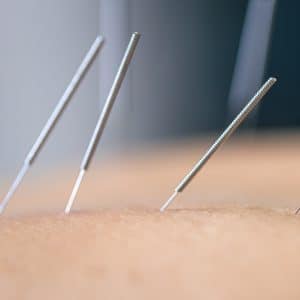Acupuncture & Chronic Pain: Unique Diagnosis

Medical Acupuncture vs Traditional Chinese Medicine Acupuncture
When it comes to chronic pain, many of my patients are already familiar with variations of “Medical Acupuncture”, such as dry needling or trigger point acupuncture, performed by their Physiotherapist or other manual therapist. These are excellent tools, but they are not traditional acupuncture. When it comes to pain that’s persisted for more than 3 months, we need to consider traditional acupuncture.
Traditional acupuncture is part of a thousands-of-years-old system that diagnoses the underlying cause of pain in a unique way. We call this a Traditional Chinese Medicine (TCM) diagnosis. The diagnosis can sound as strange as “liver qi stagnation” or “kidney yin deficiency”, and is based on information the practitioner acquires from your wrists and tongue. Crazy but true! And for those of us willing to be curious and move beyond our Western biases, it’s fascinating to consider that the tongue is the only visible mucous membrane directly connected to our digestive tract, and that the wrist is a very vulnerable part of our body where we can perhaps feel more than just our pulse.
In medical acupuncture, the needle points are generally chosen according to where you feel the pain. In traditional acupuncture, the location of the needles is based on your TCM diagnosis. I view this as part of the old dichotomy of treating symptoms vs. treating the underlying cause. Your TCM diagnosis reflects an underlying imbalance in your body and the needles are used to help the body move back into balance.
Chronic pain is different than acute pain. The body heals injuries extremely well! When pain persists beyond a normal time frame for healing, we need to look to other systems that are obstacles to resolving that pain. The newest advances in chronic pain medicine in the Western world focus on neuroplasticity and how the brain processes pain. TCM approaches take a wider view and treat the entire body (including the brain), with acupuncture points that match a TCM diagnosis.
Acupuncture for Chronic Pain
Westerners have been studying acupuncture for a long time – since President Nixon’s visit to China in the 1970s, where he received emergency surgery and anaesthesia by acupuncture. Or at least this is how the story goes in some circles. This article offers a different history of how acupuncture came to the West.
Researchers in New York published this excellent paper in 2012 that explores the question of whether acupuncture works for chronic pain. It’s a meta-analysis of 29 randomized controlled trials that include nearly 18,000 patients. Their answer was: Yes. For conditions like chronic back and neck pain, osteoarthritis, and chronic headache, the evidence suggests that acupuncture works.
Acupuncture at KIHC
I tend to recommend that patients see Jianmin (Jamie) at KIHC for acupuncture treatments when their chronic pain fits into either of these categories:
- Simple but intense pain, such as in a shoulder or neck, for people who are doing everything right from a lifestyle perspective. We know that diet and exercise are not the limiting factors here.
- Complex systemic (whole body) pain, such as in Fibromyalgia or autoimmune conditions, where the body is too tired to respond to naturopathic interventions. Regular TCM acupuncture improves the body’s resiliency, smooths out the crashes or flare-ups (especially those triggered by stress), and overall helps the body be more responsive to other treatments.
For patients who rely on extended health benefits to help pay for their healthcare services, these acupuncture services are conducted by a Registered Acupuncturist. Please see our FAQ page for some answers to common insurance questions.
References
Kaptchuk TJ. The Web That Has No Weaver: Understanding Chinese Medicine. Mcgraw-Hill; 2000.
Li Y. Acupuncture journey to America: a turning point in 1971. Journal of Traditional Chinese Medical Sciences. 2014;1(2):81-83. doi:https://doi.org/10.1016/j.jtcms.2015.03.001.
Vickers AJ, Cronin AM, Maschino AC, et al. Acupuncture for Chronic Pain. Archives of Internal Medicine. 2012;172(19):1444. doi:https://doi.org/10.1001/archinternmed.2012.3654
*Image by pvproductions on Freepik.com.